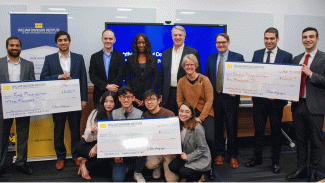Michigan Ross MBAs Win WDI’s First 24-Hour Competition, Provide Strategic Insights to African Renewable Energy Company

Bakulu Power is a young company focused on building a renewable energy “mini grid” for residents of Lubya Island in Uganda’s Lake Victoria. The company has promising technology, has completed fund-raising rounds, has garnered interest from customers, and has the support of the Ugandan government. But Bakulu Power still has a big challenge: When its mini grid is constructed, how can the company build additional demand for electricity?
Eight teams of University of Michigan students, including many from the Ross School of Business, worked furiously to answer that question during the William Davidson Institute’s first-ever 24-Hour Case Competition earlier this month. The teams had just 24 hours to research the company, the island, and its would-be customers, and prepare a compelling solution or series of solutions, to Bakulu Power’s quandary.
Vital to the competition was the fact that all solutions had to generate sustainable profits, rather than relying on grants or government funding, to operate the mini grid. The competition also challenged students to consider risks associated with new strategies and what partnerships might be required to carry out their solutions.
As she explained the challenge to students, Lucia Bakulumpagi-Wamala, CEO of Bakulu Power, noted the Ugandan government has set a goal of providing energy access to the entire country in the next 10 years. The sparsely populated Lubya Island has about 1,200 energy connections, but according to a survey of island residents, 45% have no energy access and 70% are dissatisfied with their current energy sources.
The company, which will begin construction on its solar-enabled mini grid in the third quarter of this year, has explored other productive uses for renewable energy, including ice production. But in describing the challenge, Bakulumpagi-Wamala explained the importance of bringing in outside points of view.
“When you’re really close to something you can miss something very obvious … (Students) can look at this from a fresh perspective,” Bakulumpagi-Wamala told the competing students. “I think it’s important that the teams had such a short time frame because that’s really how this kind of work actually works. There are so many things that can change … you have to learn how to think really quickly.”
In their 15-minute presentations, students showcased a wide variety of solutions, many of which looked to harness the dominant industry on the island: fishing. Bakulumpagi-Wamala, WDI President Paul Clyde, and Mike Kosonog, a partner in the Deloitte & Touche LLP Audit, and Enterprise Risk Services group, all served as judges in the competition.
Michigan Ross MBA students Maneel Grover and Avinav Sinha, both graduating in 2020 and both originally from Delhi, India, took first place, earning a $3,000 cash prize. Their winning solution focused on equipping fishing boats with electric motors and helping to develop the businesses necessary to service those craft.
In addition, a team of Ross BBA students comprised of Ashley Hwang, Haotian Jiang, Maya Malouin, and Brian Zhao, came in third place, earning a $1,000 check. Their solution explored incentivizing electric cooking instead of the more commonly used charcoal, implementing water purification systems, and developing new cold storage systems.
Bakulumpagi-Wamala said she was overwhelmed by the students’ questions, their presentations and the energy they brought to the competition.
“Twenty-four hours later, I cannot believe the level of detail in the research the students did and I think I actually learned more than they did,” she said. “This challenge has been incredibly timely, we still have time to make adjustments and deploy some of the ideas we heard.”







